(完整版)中考英语易混词汇辨析
初中英语中考易混词汇辨析(精选9组)

初中英语易混词汇辨析一、how much和how manyhow much和how many:how much用来询问事物的数量,后接不可数名词;how many用来询问事物的数量,后接可数名词复数。
1.所修饰词不同how much用来修饰不可数名词,表示数量,也可单独使用。
how many用来修饰可数名词的复数,它的句式是:How many+复数名词+一般疑问句+?[例句]How much milk is there in the glass?玻璃杯里有多少牛奶?How many books are there on the desk?有多少本书在桌子上?2.用法不同How much 表示多少钱,用来问价格。
[例句]How much is this dress?这个连衣裙多少钱?How many 表示多少,用来问数量。
[例句]How many apples do you have?你有多少苹果?二、in和on当我们表示某些东西被其他东西所包围时使用“in”这个词。
而“on”用于描述物体被放置在其他物体上方或外部的情况。
in可表时间,表地点,表手段、方法、材料。
on表示时间、地点、方位等。
1.意思不同in:prep.在 ... 里;在 ... 地方;在 ... 期间on:prep.在 ... 之上2.用法不同in:in着重一段时间的过程,常用于重复动作或延续动作。
in表示从现在时间算起推移到将来的一段时间之后,一般与将来时态连用。
[例句]He is a layman in economics.他对经济学一窍不通。
on:表示“在物体的表面上”,只能用on的表达方式有on the next morning,on the following。
[例句]The spider is walking on the ceiling.蜘蛛在天花板上爬行。
3.侧重点不同in:表示“在其中”。
on:表示“在表面”。
三、if和whetherif和whether:if和whether在宾语从句中,都表“是否”,可换用,if更口语化,whether 正式些。
中考英语热点易混词汇辨析.doc

中考英语热点易混词汇辨析1. sound, voice, noise, shout词义辨析:sound指自然界各利|各样的声音;voice特指人的嗓音、(风等的)声音或鸟的叫声;noise 指噪昔;shout指人或动物的叫喊,也指予以警告或引起注意[fo发出的叫喊。
女口:Did you hear the strange sound just now?刚才你有没有听到那个奇怪的声音?It is very nice to hear your voice.听到你的声音真是太好了。
Don't make a noise outside; I want to have a rest.别再发出噪音了,我想休息一会儿。
Suddenly, the patient raised a shout of pain.突然病人发出痛苦的叫声。
2. be famous for, be famous as词义辨析:be famous for意为“因…•而著名”,be famous as意为“作为…•而有名”。
如: Hangzhou is famous for the West Lake.杭州因西湖而著名。
He is famous as a short story writer.他是著名的短篇小说家。
3. how long, how often, how soon词义辨析:how long表示“多长”,常用来询问物体长度,也可询问动作或状态延续多长吋间,常就for引导的吋间段提问;how often常用来询问频率;how soon常用来询问某人要过多久才能做某事。
How long have you worked in our school?你在我们学校工作了多长吋间?How often do you see a film?Once every four weeks?你多长时间看一场电影?每四周一次吗?How soon can we have a holiday? In a week?还要过多久我们才能有假期?一周吗?4. one, it词义辨析:one表示与上文中提到的同类物品,而it则指上文所提到的物品。
2024中考备考英语重难点01 易混名词辨析(解析版)
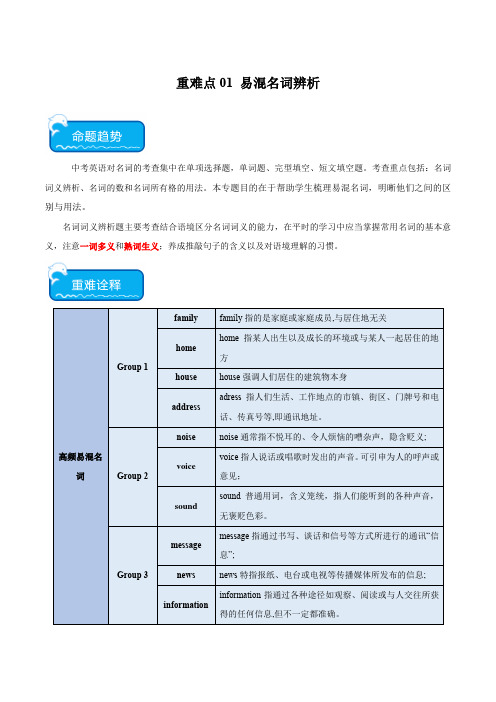
重难点01 易混名词辨析中考英语对名词的考查集中在单项选择题,单词题、完型填空、短文填空题。
考查重点包括:名词词义辨析、名词的数和名词所有格的用法。
本专题目的在于帮助学生梳理易混名词,明晰他们之间的区别与用法。
名词词义辨析题主要考查结合语境区分名词词义的能力,在平时的学习中应当掌握常用名词的基本意义,注意一词多义和熟词生义;养成推敲句子的含义以及对语境理解的习惯。
(2023中考真题建议用时:15分钟)1.(2023·辽宁鞍山·中考真题)—Why does Mary get good grades each time?—I think that’s because she puts most of her ________ into her schoolwork.A.energy B.practice C.exercise D.process2.(2023·内蒙古·中考真题)—The model plane is wonderful! How did you make it?—It’s easy. Follow the ________ and you can do it, too.A.discussion B.education C.conditions D.instructions3.(2023·江苏淮安·中考真题)As a student, you should keep a ________ between your schoolwork and yourhobbies.A.diary B.record C.secret D.balance4.(2023·湖北襄阳·中考真题)—Mr. Fan runs at least half an hour every day.—What a good ________! No wonder he looks healthy.A.habit B.question C.article D.prediction5.(2023·湖北黄石·中考真题)—Could you tell me the ________ of making such tasty dumplings?—Well, I just follow the steps on Tiktok.A.cost B.method C.time D.menu6.(2023·内蒙古呼和浩特·中考真题)High-speed trains are seen as one of the new Four Great ________ of China.A.Inventions B.Advantages C.Environments D.Technologies7.(2023·江苏常州·中考真题)After she was brought back to China, the sick giant panda Ya Ya received good ________ in her new home and got better.A.education B.communication C.entertainment D.treatment8.(2023·江苏南通·中考真题)—________ are easily made, but not easily kept.—That’s true. Once you make one, be sure to keep it.A.Speeches B.Decisions C.Promises D.Suggestions9.(2023·江苏镇江·中考真题)The main ________ of the cities along the Grand Canal (大运河) is history and culture.A.attraction B.pollution C.invention D.situation10.(2023·青海·中考真题)A taxi driver prevented (阻止) an _________ when he saw a car with serious problems travelling across Huangnan.A.accident B.interview C.advertisement11.(2023·山东青岛·中考真题)Before flying a plane, a ________ must take a lot of training.A.policeman B.musician C.nurse D.pilot12.(2023·湖北十堰·中考真题)—How did you fix up the machine, dad?—It’s easy. I just followed the ________.A.instructions B.inventions C.interviews D.influences13.(2023·江苏徐州·中考真题)Of all the ________, I love summer best.A.seasons B.subjects C.colours D.hobbies14.(2023·辽宁丹东·中考真题)Mary’s parents are interested in ________, so they often take her to concerts.A.sports B.music C.science D.movies15.(2023·江苏宿迁·中考真题)—The girl’s beautiful pronunciation caught our ________ in yesterday’s English speech competition.—Yes, many students couldn’t help cheering for her.A.condition B.attention C.invention D.position16.(2023·江苏泰州·中考真题)—Good news! The Chinese women table tennis team won a gold and a silver again.—Great! No matter who wins the medals, it is the ________ of our country.A.price B.pioneer C.pride D.pain17.(2023·黑龙江牡丹江·中考真题)Although our school life is a little busy, it is full of ________.A.pain B.sadness C.laughter18.(2023·四川遂宁·中考真题)—Which movie would you like to watch, Tracy?— Um…it’s hard to make a ________.A.survey B.choice C.call D.wish19.(2023·辽宁·中考真题)Thanks to the teacher’s help, I solved all the ________ easily.A.chances B.problems C.habits D.grades20.(2023·辽宁营口·中考真题)Scientists who are full of ________ always come up with new ideas and bring great changes to our life.A.instruction B.instrument C.invention D.introduction1.A【详解】句意:——为什么玛丽每次都取得好成绩?——我想那是因为她把大部分精力都放在功课上了。
初中英语核心词:易混词汇辨析

sad [sæd] a. (使人)悲伤的safe [seɪf] a.n. 安全的;保险柜safety [ˈseɪftɪ] n. 安全,保险There’s safety in numbers 人多势众sail[seɪl] n.v. 航行;航行;开航salad [ˈsæləd] n. 色拉(西餐中的一种凉拌菜);沙律sale [seɪl] n. 卖;出售salt [sɔːlt, sɔlt] n. 盐same [seɪm] n.a. 同样的事;同样的,同一的sand [sænd] n. 沙,沙子sandwich [ˈsænwɪdʒ] n. 三明治(夹心面包片)satisfy [ˈsætɪsfaɪ] n 满意,满足Saturday [ˈsætədɪ] n. 星期六save [seɪv] vt. 救,挽救,节省save one’s life 挽救某人的生命save one’s face 保全面子save the situation 挽回局势save one’s breath 保持沉默save time 节约时间save on 节约,节省We will save a lot of time if we go by car.我们要是乘汽车去可以节省很多时间。
say(said, said) [seɪ] vt. 说,讲go without saying 显而易见say to oneself 自言自语scarf[skɑːf] n. 领巾;围巾school [skuːl] n. 学校schoolbag['sku:lbæg] n. 书包science [ˈsaɪəns] n. 科学,自然科学scientist[ˈsaɪəntɪst] n. 科学家scissors [ˈsɪzəz] n. 剪刀score [skɔː(r)] n.&v. 得分;分数a score-keeper 记分员a score –sheet 记分单a score of 二十个screen [skriːn] n. 幕,荧光屏sea[siː] n. 海,海洋in the sea 在海里on the sea 在海滨by sea 乘船a sea of flames 一片火海search [sɜːtʃ] n.&v. 搜寻,搜查search for sb/sth 寻找某人/某物Rescue workers searched all night in the hope of finding more survivors.营救人员彻夜搜寻,希望找到更多的幸存者。
50组考试易混淆重点英语词汇分类辨析

50组考试易混淆重点英语词汇分类辨析英语中有些单词十分相似,我们明明都认识,却经常记混意思,因此,这些易混淆词汇都是极易丢分的知识点之一。
本文为大家整理50组高频易混淆词,记得收藏记忆。
after, in这两个介词都可以表示“……(时间)以后”的意思。
after以过去为起点,表示过去一段时间之后,常用于过去时态的句子中。
例句:She went after three days.她是三天以后走的。
in以现在为起点,表将来一段时间以后,常用于将来时态的句子中。
例句:She will go in three days.她三天以后要走。
how long, how often, how soonhow long指多长时间,主要用来对一段时间(如three days, four weeks等)提问。
例句:How long ago was it?这是多久前的事了?how often指每隔多久,主要用来对频率副词或状语(如once a week等)提问。
例句:—How often does he come here?—他(每隔)多久来一次?—Once a month.—每月一次。
how soon指再过多久,主要用来对表示将来的一段时间(in an hour, in two weeks 等)提问。
例句:How soon can you come?你多快能赶来?few, a few, little, a little, several, somefew和little的意思是否定的,表示“很少”或“几乎没有”;a few和a little的意思是肯定的,表示“有一些,有一点儿”。
few和a few修饰可数名词;little和a little修饰不可数名词。
several用于修饰可数名词,语意比a few和some更肯定,含有“好几个”的意思。
some可修饰可数名词,也可修饰不可数名词,从数量上说,它有时相当于a few或a little,有时指更多一些的数量。
中考英语重点词语辨析50个

中考英语重点词语辨析50组中考英语词语辨析主要考查同义、近义、形近词汇以及词组与习惯用法,多出现在单选或完形填空中。
在平常的英语学习中,同学们可能缺少系统的词语辨析训练,所以考试遇到这类考点总是失分,今天豆姐要跟大家分享的就是中考英语的50组词语辨析,帮助大家扫清词语辨析的障碍!1.after, in这两个介词都可以表示“……(时间)以后”的意思。
after 以过去为起点,表示过去一段时间之后,常用于过去时态的句子中。
如:She went after three days. 她是三天以后走的。
in 以现在为起点,表将一段时间以后,常用于将时态的句子中。
如:She will go in three days. 她三天以后要走。
2.how long, how often, how soonhow long指多长时间,主要用对一段时间(如three days, four wees 等)提问。
如:How long ago was it? 这是多久前的事了?how often指每隔多久,主要用对频率副词或状语(如once a wee等)提问。
如:—How often does he come here? —Once a month. 他(每隔)多久一次?每月一次?how soon指再过多久,主要用对表示将的一段时间(in an hour, in two wees 等)提问。
如:How soon can you come? 你多快能赶?3.few, a few, little, a little, several, somefew 和little的意思是否定的,表示“很少”或“几乎没有”;而a few和a little的意思是肯定的,表示“有一些,有一点儿”。
few 和 a few修饰可数名词;little 和 a little 修饰不可数名词。
several用于修饰可数名词,语意比a few和some更肯定,含有“好几个”的意思。
(完整版)中考英语易混词汇辨析
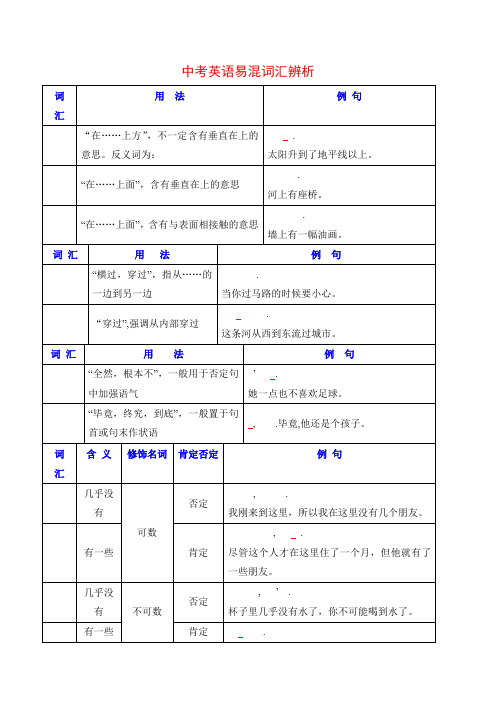
不可数
否定
, ’ .
杯子里几乎没有水了,你不可能喝到水了。
有一些
肯定
.
杯子里有一些水。
词汇
含义
用法
例句
以前
只用于一般过去时,表示从现在算起的一段时间以前
.
他是两年前去世的。
后接“时间点”,可用于任何时态;它也可放在“时间段”后,用于完成时或一般过去时
’.
我下午五点钟前到了那里。
.
我以前没见过他。
词汇
用法
一言辨义
“单独的”,只能作表语,强调数量单一
, .
他独自一人生活着,但是他从不感到寂寞。
“孤独的,寂寞的”,强调心理感受
词汇
含义
用法
例句
已经
常用于肯定句,多与完成时和进行时连用。用于疑问句时表示问话人持怀疑、惊异的态度
.我已经做完了。
?
已经到星期天啦?
通常用于疑问句和否定句,在疑问句中意为“已经”,在否定句中意为“还,尚未”
.
他在上学的路上买了一支钢笔。
“挡路;妨碍”
.你的小汽车挡路了。
词汇
含义
用法
例句
因为
是连词,其后接句子
’ .
因为病了,他没来。
是复合介词,其后接名词、代词、动名词、从句等
.
因为天气不好,我们不得不推迟会议。
词汇
用法
例句
如果后接宾语从句,意为“恐怕……”,用来表示带有歉意的回话或引出令人不满意的消息
’’ .
’ .
我从图书馆借了两本书。
意为“借出”,常跟介词搭配
?
能把你的字典借给我吗?
词汇
用法
例句
(完整word版)中考英语易混淆词汇辨析
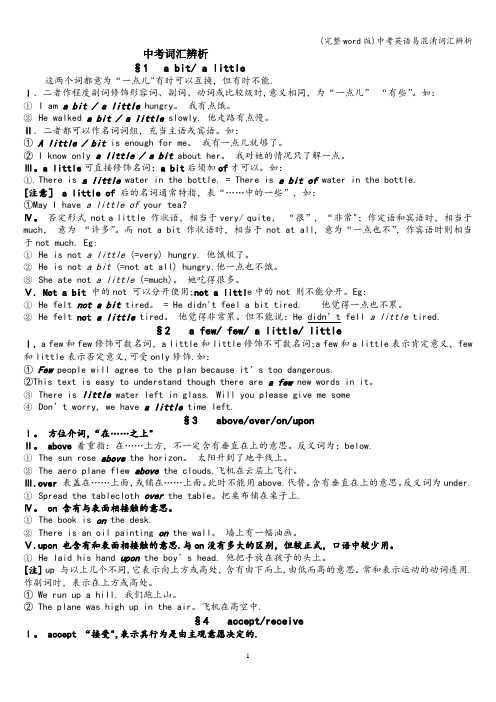
中考词汇辨析§1 a bit/ a little这两个词都意为“一点儿"有时可以互换,但有时不能.Ⅰ.二者作程度副词修饰形容词、副词、动词或比较级时,意义相同,为“一点儿”“有些”。
如:①I am a bit / a little hungry。
我有点饿。
②He walked a bit / a little slowly. 他走路有点慢。
Ⅱ.二者都可以作名词词组,充当主语或宾语。
如:①A little / bit is enough for me。
我有一点儿就够了。
② I know only a little / a bit about her。
我对她的情况只了解一点。
Ⅲ。
a little可直接修饰名词;a bit后须加of才可以。
如:①.There is a little water in the bottle. = There is a bit of water in the bottle.[注意] a little of后的名词通常特指,表“……中的一些”,如:①May I have a little of your tea?Ⅳ。
否定形式 not a little 作状语,相当于very/ quite,“很”, “非常";作定语和宾语时,相当于much,意为“许多”。
而not a bit 作状语时,相当于not at all, 意为“一点也不”,作宾语时则相当于not much. Eg:①He is not a little (=very) hungry. 他饿极了。
②He is not a bit (=not at all) hungry.他一点也不饿。
③She ate not a little (=much)。
她吃得很多。
Ⅴ. Not a bit中的not 可以分开使用;not a littl e中的not 则不能分开。
Eg:①He felt not a bit tired。
中考之易混淆词汇辨析

中考之易混淆词汇辨析(1)a few , a little , few , littleA few , a little 意思是“几个”、“一些”,是肯定的意思;few、little 意思是“很少几个”、“几乎没有”,是否定的意思。
few、a few与可数名词连用或代替可数的事物;little、a little与不可数名词连用或代替不可数的事物。
例如:A few people like such things.有少数人喜欢那样的东西。
There is still a little hope,so don't give up.希望还是有的,所以你不要放弃。
He has few friends.他几乎没有朋友。
We had little time to do it.我们没什么时间做此事。
(2)across ,throughacross指街道、河流等的“跨越”;through指门洞、人群、森林等的“穿越”。
例如:Ben is going to swim across the English Channel next year.本准备明年游泳横渡英吉利海峡。
What do Peter and Jack meet whentheu go through a forest? 当彼得和杰克穿过森林的时候,他们遇见了什么?(3)all、bothAll指三者或三者以上的人或物,用来替代或修饰可数和不可数的名词;both指两个人或物,用来替代或修饰可数名词。
例如:All his friends have deserted him and now he is all by himself. 他所有的朋友都离弃他,现在他孤身一人。
He grasped both my hands.他紧握住我的双手。
(4)alone、lonelyAlone意思是“独自的、单独的”,指无人陪伴;lonely意思是“孤独的,寂寞的”,表示心理活动。
中考英语重点词语辨析50个
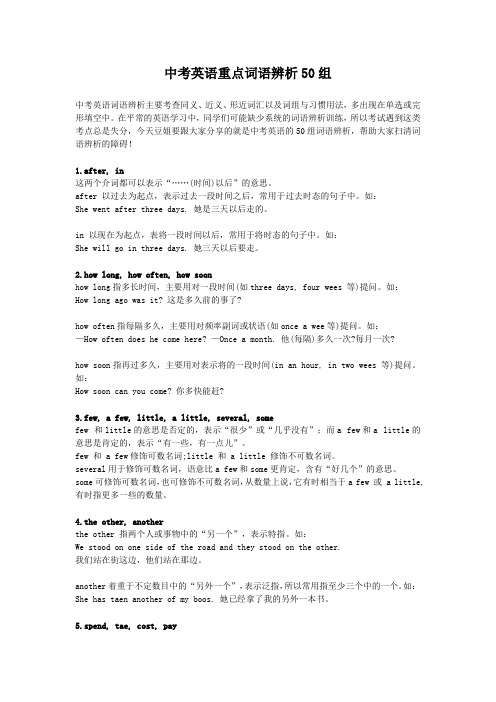
中考英语重点词语辨析50组中考英语词语辨析主要考查同义、近义、形近词汇以及词组与习惯用法,多出现在单选或完形填空中。
在平常的英语学习中,同学们可能缺少系统的词语辨析训练,所以考试遇到这类考点总是失分,今天豆姐要跟大家分享的就是中考英语的50组词语辨析,帮助大家扫清词语辨析的障碍!1.after, in这两个介词都可以表示“……(时间)以后”的意思。
after 以过去为起点,表示过去一段时间之后,常用于过去时态的句子中。
如:She went after three days. 她是三天以后走的。
in 以现在为起点,表将一段时间以后,常用于将时态的句子中。
如:She will go in three days. 她三天以后要走。
2.how long, how often, how soonhow long指多长时间,主要用对一段时间(如three days, four wees 等)提问。
如:How long ago was it? 这是多久前的事了?how often指每隔多久,主要用对频率副词或状语(如once a wee等)提问。
如:—How often does he come here? —Once a month. 他(每隔)多久一次?每月一次?how soon指再过多久,主要用对表示将的一段时间(in an hour, in two wees 等)提问。
如:How soon can you come? 你多快能赶?3.few, a few, little, a little, several, somefew 和little的意思是否定的,表示“很少”或“几乎没有”;而a few和a little的意思是肯定的,表示“有一些,有一点儿”。
few 和 a few修饰可数名词;little 和 a little 修饰不可数名词。
several用于修饰可数名词,语意比a few和some更肯定,含有“好几个”的意思。
中考常见易混淆英语单词

中考常见易混淆英语单词1.worth, worthy 与worthwhileworth价值,可贵之处,作形容词时与worthy和worthwhile都是“值得……”的意思,但用法不同,如:This book is worth reading./This book is worth 3 yuan?./It s wort hwhile to visit (visiting) thisplace./This place is worthy of a visit (visiting ).worth只作表语,它后面一般接动名词,也可接名词,但只限于钱数,不接不定式。
如果用不定式或动名词作主语,则要用It s worthwhile…结构,把不定式、动名词放在句末;worthy是形容词,worthy可作表语,也可作定语,作表语时,后跟of接名词或动名词,也可以接不定式。
worthwhile和worth虽均有“值得的”意思,worth只作表语,用于be worth sth.短语中,如:It s worth the trouble.麻烦一点值得。
This watch is worth this much money.这块手表值这么多钱;而worthwhile意为“值得一做的(worth doing)”,既可作表语,如:T hese results were not worthwhile.也可用作定语。
2.rise 与 raise这两个词虽不同义,但因意义上有联系而易被混淆。
rise 上升,上涨,起床,站立。
含义较广,总的意思是指依次上升,如自然界的日、月、星、雾、云的上升,人体从睡、跪、坐、躺等姿势站立起来等。
该词为不及物动词,其过去式与过去分词分别是rose 和 risen。
例如:The sun rises in the east and sets in the west.日出于东而落于西。
/ Prices rise every day in those countries.那些国家里的物价天天上涨。
中考英语之易混淆词汇知识点辨析
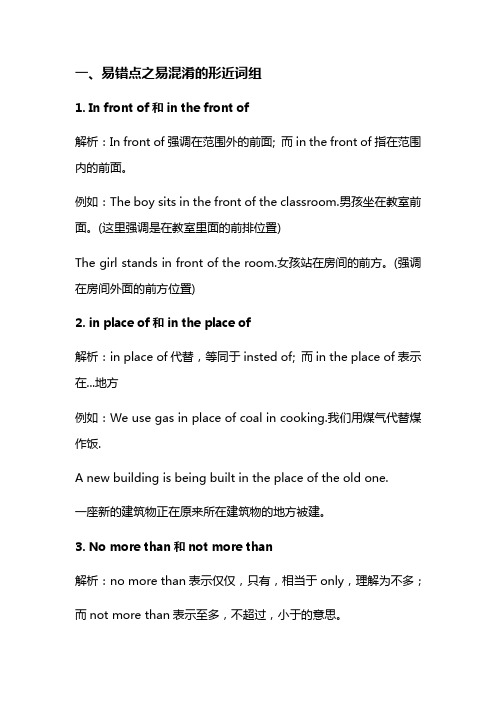
一、易错点之易混淆的形近词组1.In front of和in the front of解析:In front of强调在范围外的前面; 而in the front of指在范围内的前面。
例如:The boy sits in the front of the classroom.男孩坐在教室前面。
(这里强调是在教室里面的前排位置)The girl stands in front of the room.女孩站在房间的前方。
(强调在房间外面的前方位置)2.in place of和in the place of解析:in place of代替,等同于insted of; 而in the place of表示在...地方例如:We use gas in place of coal in cooking.我们用煤气代替煤作饭.A new building is being built in the place of the old one.一座新的建筑物正在原来所在建筑物的地方被建。
3.No more than和not more than解析:no more than表示仅仅,只有,相当于only,理解为不多;而not more than表示至多,不超过,小于的意思。
例如:He is no more than an ordinary English teacher. 他只不过是个普通的英文老师。
He has not more than three children. 他最多3 个孩子(有或许还不到三个)4.On earth和on the earth解析:两者都有在地上,在地球上的意思,但on earth还有到底,究竟的意思;On the earth只是单纯的表示在地上,在地球上例如:where on earth did you spring from?你究竟从哪里冒出来的?What if there was no lead on the earth at all?如果地球上根本就没有铅这种物质怎么办?5.At all和after all解析:at all表示根本,全然的意思,常用短语not at all表示一点也不;after all表示到底,毕竟的意思例如:I don't know him at all. 我根本不认识他。
中考20组必考英语易混词辨析

初中必考20组必考英语易混词辨析——易混词辨析——1、accomplish vs. achieveaccomplish (v.): 完成某项任务。
例子: She accomplished her homework. (她完成了作业。
)achieve (v.): 实现目标。
例子: He achieved his goal. (他实现了他的目标。
)2、advice vs. adviseadvice (n.): 建议。
例子: I need your advice. (我需要你的建议。
)advise (v.): 提供建议。
例子: I advise you to study. (我建议你学习。
)3、allow vs. permitallow (v.): 允许,通常口语化。
例子: My parents allow me to go out. (我的父母允许我出去。
)permit (v.): 允许,通常正式。
例子: The school permits it. (学校允许这样做。
)4、bored vs. boringbored (adj.): 感到无聊的。
例子: I feel bored in class. (我在课堂上感到无聊。
)boring (adj.): 令人无聊的。
例子: The movie was boring. (这部电影很无聊。
)5、careful vs. cautiouscareful (adj.): 小心的。
例子: Be careful with that glass. (小心那只玻璃杯。
)cautious(adj.): 小心翼翼的,避免风险。
例子: He is cautious with money. (他在处理钱时很小心。
)6、common vs. ordinarycommon (adj.): 普遍的。
例子: It is common to use phones. (使用手机是很常见的。
中考易混词汇辨析

中考易混词汇辨析1.few和little【辨析】few只能修饰复数可数名词,little 只能修饰不可数名词。
Few people can live well with little money.2.a few和a little【辨析】a few只能修饰复数可数名词,a little 只能修饰不可数名词。
I need a little time to do a few things.3.a lot和a lot of【辨析】a lot只用作副词,相当于very much;a lot of 则用作定语修饰名词。
You’ve given me a lot of help. Thanks a lot.4.able和capable【辨析】able常以be able to do sth. 的形式出现,表示“有能力做某事”。
capable常以be capable of doing sth. 的形式出现。
He is able to speak three foreign languages.I am sure he is capable of doing the job well.5.accept和receive【辨析】accept表示主观上接受某物,receive表示客观上收到某物。
Jane __accepted______ a gift from Jim, but she didn’t __receive______ it.6.across和through【辨析】across指从物体的表面经过;through指从物体的内部或空间穿过。
He swam across a river and walked through a forest before he got to the village.7.ago和before【辨析】ago只作副词,不能单独使用,必须与表示时间的词连用,用于从现在算起的某段时间之前,常与一般过去时连用。
(完整版)初中英语中考易混易错同义词辨析大全
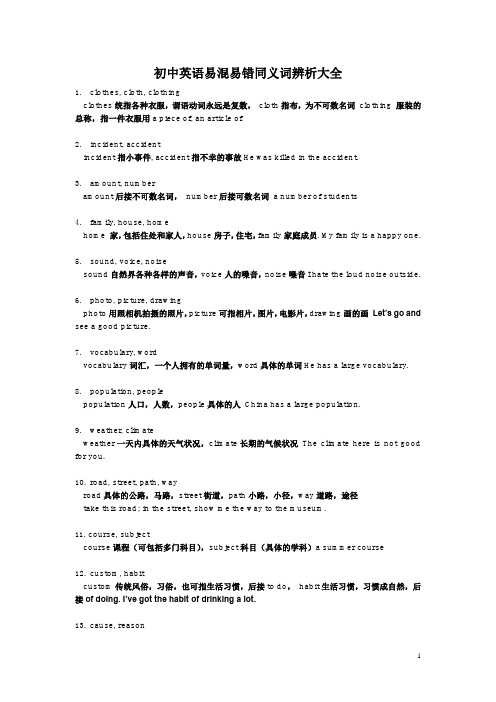
初中英语易混易错同义词辨析大全1.clothes, cloth, clothingclothes统指各种衣服,谓语动词永远是复数,cloth指布,为不可数名词clothing 服装的总称,指一件衣服用a piece of, an article of2.incident, accidentincident指小事件, accident指不幸的事故He was killed in the accident.3.amount, numberamount后接不可数名词,number后接可数名词a number of students4.family, house, homehome 家,包括住处和家人,house房子,住宅,family家庭成员. My family is a happy one.5.sound, voice, noisesound自然界各种各样的声音,voice人的嗓音,noise噪音I hate the loud noise outside.6.photo, picture, drawingphoto用照相机拍摄的照片,picture可指相片,图片,电影片,drawing画的画Let’s go and see a good picture.7.vocabulary, wordvocabulary词汇,一个人拥有的单词量,word具体的单词He has a large vocabulary.8.population, peoplepopulation人口,人数,people具体的人China has a large population.9.weather, climateweather一天内具体的天气状况,climate长期的气候状况The climate here is not good for you.10.road, street, path, wayroad具体的公路,马路,street街道,path小路,小径,way道路,途径take this road; in the street, show me the way to the museum.11. course, subjectcourse课程(可包括多门科目),subject科目(具体的学科)a summer course12.custom, habitcustom传统风俗,习俗,也可指生活习惯,后接to do,habit生活习惯,习惯成自然,后接of doing. I’ve got the habit of drinking a lot.13.cause, reasoncause 指造成某一事实或现象的直接原因,后接of sth./doing sth,reason用来解释某种现象或结果的理由,后接for sth./doing sth. the reason for being late14.exercise, exercises, practiceexercise运动,锻炼(不可数),exercises练习(可数),practice(反复做的)练习Practice makes perfect.15.class, lesson作"课"解时,两者可以替换.指课文用lesson. 指班级或全体学生用class. lesson 6; class 516. speech, talk, lecturespeech指在公共场所所做的经过准备的较正式的演说,talk日常生活中的一般的谈话,讲话,lecture学术性的演讲,讲课a series of lecture on…17.officer, officialofficer部队的军官,official政府官员an army officer18.work, job二者均指工作。
中考英语易混词汇辨析.doc

中考英语易混词汇辨析中考英语易混词汇辨析above/over/on词汇用法例句above “在……上方”,不一定含有垂直在上的意思。
反义词为:belowThe sun rose above the horizon.太阳升到了地平线以上。
over “在……上面”,含有垂直在上的意思There is a bridge over the river. 河上有座桥。
on “在……上面”,含有与表面相接触的意思There is an oil painting on the wall. 墙上有一幅油画。
across/through词汇用法例句across “横过,穿过”,指从……的一边到另一边Be careful when you walk across the road.当你过马路的时候要小心。
through “穿过”,强调从内部穿过The river flows through the city from west to east. 这条河从西到东流过城市。
at all/ after all词汇用法例句at all “全然,根本不”,一般用于否定句中加强语气She doesn’t like football at all.她一点也不喜欢足球。
after all “毕竟,终究,到底”,一般置于句首或句末作状语After all, he is a child.毕竟,他还是个孩子。
few / a few / little / a little词汇含义修饰名词肯定/否定例句few 几乎没有可数否定I am a new comer here, so I have few friendshere.我刚来到这里,所以我在这里没有几个朋友。
a few 有一些肯定Though the man has been here for only one month, he has a few friends.尽管这个人才在这里住了一个月,但他就有了一些朋友。
- 1、下载文档前请自行甄别文档内容的完整性,平台不提供额外的编辑、内容补充、找答案等附加服务。
- 2、"仅部分预览"的文档,不可在线预览部分如存在完整性等问题,可反馈申请退款(可完整预览的文档不适用该条件!)。
- 3、如文档侵犯您的权益,请联系客服反馈,我们会尽快为您处理(人工客服工作时间:9:00-18:30)。
中考英语易混词汇辨析
一种状态的变化,后接形容词或名词他成为了一名医生。
词汇用法例句
表动作,指“去睡觉”
我经常很晚才去睡觉。
也表动作,指进入“睡着”状态
他发现很难入睡。
表动作,意为“刚刚入睡”,指“刚
睡着”的动作
.他刚睡着,这时有人大声敲门。
表状态,意为“睡着的”
这孩子睡着一个小时了。
词汇含义用法例句
发生常指具体事件的发生,特别指那些
偶然的或不能预见的“发生”
?
这事故是怎样发生的?
通常指“(某事)按计划进行或按计划
发生”,此外还有“举行”之意解放以后,发生了巨大变化。
例句
词汇用法
表示“曾经到过某处”,但目前人
不在那儿
? 你到哪儿去了?
表示“去了”,指人已经走了(至少
目前不在说话的地点,在去的途中
或已经到达目的地)
她不在这儿。
她去南京了。
表示“去了某地,并曾在那儿(一段
时间),或现在仍在那儿”她在上海待了几个周了。
词汇用法一言辨义“听到”,强调听的结果,不一定是有意识
的
“听”,强调听的动作,当然未必能听到什
么。
是不及物动词,接宾语时要加
我们仔细地听了半天,但什么也没听到。
词汇用法例句。
